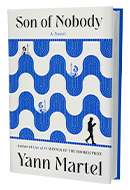 In a review of Nathan Englander's 1999 debut short story collection, For the Relief of Unbearable Urges, the New York Times described him as a writer who "combines a compassionate grasp of the Orthodox Jewish world with the skeptical irreverence of one estranged from yet still oddly defined by it." Englander's fiction, he continued, "is not so much a betrayal of Orthodox Judaism as it is a revelation of the human condition." Now, two decades on in a career that's produced two novels and another volume of short stories, Englander returns to this milieu with the novel kaddish.com, the affecting story of what happens when a one-time secular Jew searches for redemption in a world of religious fundamentalism he's long ago abandoned.
In a review of Nathan Englander's 1999 debut short story collection, For the Relief of Unbearable Urges, the New York Times described him as a writer who "combines a compassionate grasp of the Orthodox Jewish world with the skeptical irreverence of one estranged from yet still oddly defined by it." Englander's fiction, he continued, "is not so much a betrayal of Orthodox Judaism as it is a revelation of the human condition." Now, two decades on in a career that's produced two novels and another volume of short stories, Englander returns to this milieu with the novel kaddish.com, the affecting story of what happens when a one-time secular Jew searches for redemption in a world of religious fundamentalism he's long ago abandoned.
When 30-year-old Brooklyn resident Larry's father dies in Memphis, Tenn., in 1999, he returns to his sister Dina's home for the funeral and the traditional week of mourning known as shiva. As that ritual ends, Larry, a porn-loving marketer who applies his "Zazen-based mindfulness" to help him survive the experience, devastates Dina with the news that he won't recite the Kaddish, the mourning prayer whose repetition at three services each day for 10 months ensures their deceased father a blessed afterlife. Instead, he registers on the titular website, "like a JDate for the dead," where, for a fee, a yeshiva student in Jerusalem will recite the prayer in his place.
Just when it appears Englander will be satirizing the conflict between the seductions of modernity and the demands of Orthodox belief and practice, he upends that expectation and turns right, onto a more serious path. Fast-forward 20 years, and Larry--now Reb Shuli, a married father of two, teaching Talmud to seventh graders at a yeshiva--has abandoned his upscale Brooklyn neighborhood for one in the same borough amid his fellow pious Jews. A troubled 12-year-old student has lost his father, but is too young to have the obligation of reciting the Kaddish imposed on him. This triggers Shuli's urgent need to connect with the devout Jew he believes has been reciting that prayer in his place, in order to reclaim the sacred duty he forsook so casually.
kaddish.com's sensibility seems more rooted in the 19th century than the 21st. For all the role technology plays in its plot, it's more evocative of Isaac Bashevis Singer's characters than of the secular Jewish mourners in Jonathan Tropper's This Is Where I Leave You. But even readers to whom these practices are unfamiliar should have little difficulty connecting with the impulses that drive Shuli to embark on a quest to undo his rash decision to cast off tradition. Englander portrays that frantic quest--one that jeopardizes Shuli's marriage, his job, even his sanity--with curiosity and deep sympathy, evoking a response that transcends the boundaries of any particular faith. --Harvey Freedenberg, freelance reviewer
Shelf Talker: Nathan Englander returns to his roots in Orthodox Judaism for an exploration of how one man seeks to right a seemingly irrevocable wrong.










 WH Smith has opened its
WH Smith has opened its _030319.jpg)


 Chelsea Green Publishing had a lot to celebrate last week: its book Eager by Ben Goldfarb won the PEN American Literary Award for Science Writing; the company became 100% employee-owned; and it was also the house's 35th birthday. Above: the Chelsea Green staff in White River Junction, Vt., making a celebratory toast to Goldfarb.
Chelsea Green Publishing had a lot to celebrate last week: its book Eager by Ben Goldfarb won the PEN American Literary Award for Science Writing; the company became 100% employee-owned; and it was also the house's 35th birthday. Above: the Chelsea Green staff in White River Junction, Vt., making a celebratory toast to Goldfarb. In a travel piece showcasing Fairhope, Ala., and headlined "A
In a travel piece showcasing Fairhope, Ala., and headlined "A  The Storyteller
The Storyteller In a review of Nathan Englander's 1999 debut short story collection, For the Relief of Unbearable Urges, the New York Times described him as a writer who "combines a compassionate grasp of the Orthodox Jewish world with the skeptical irreverence of one estranged from yet still oddly defined by it." Englander's fiction, he continued, "is not so much a betrayal of Orthodox Judaism as it is a revelation of the human condition." Now, two decades on in a career that's produced two novels and another volume of short stories, Englander returns to this milieu with the novel kaddish.com, the affecting story of what happens when a one-time secular Jew searches for redemption in a world of religious fundamentalism he's long ago abandoned.
In a review of Nathan Englander's 1999 debut short story collection, For the Relief of Unbearable Urges, the New York Times described him as a writer who "combines a compassionate grasp of the Orthodox Jewish world with the skeptical irreverence of one estranged from yet still oddly defined by it." Englander's fiction, he continued, "is not so much a betrayal of Orthodox Judaism as it is a revelation of the human condition." Now, two decades on in a career that's produced two novels and another volume of short stories, Englander returns to this milieu with the novel kaddish.com, the affecting story of what happens when a one-time secular Jew searches for redemption in a world of religious fundamentalism he's long ago abandoned.